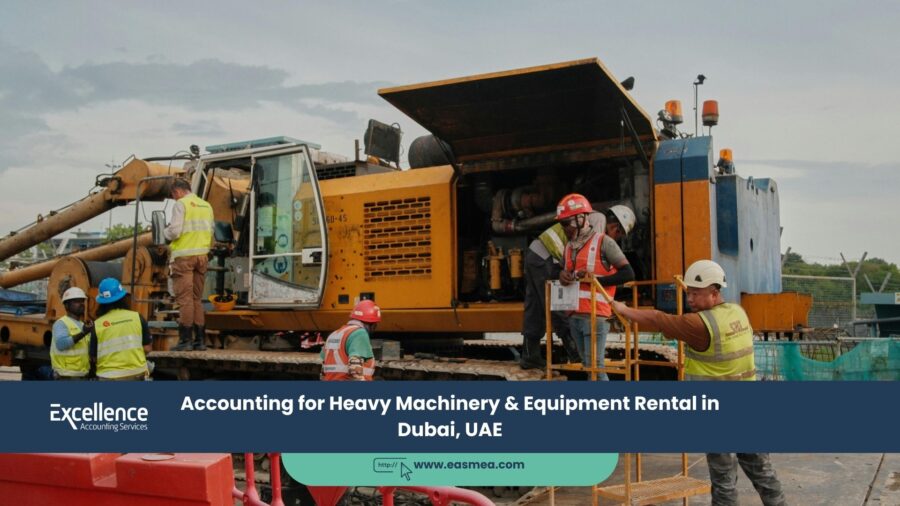Accounting for Heavy Machinery & Equipment Rental in Dubai, UAE
Dubai’s booming construction and industrial sectors are built on a foundation of heavy machinery and equipment. For businesses in the rental industry, this creates a landscape of immense opportunity. However, this is a capital-intensive business where profitability is determined not just by rental rates, but by the meticulous financial management of high-value, long-life assets. The accounting for a heavy equipment rental company is fundamentally different from a standard trading business.
- Accounting for Heavy Machinery & Equipment Rental in Dubai, UAE
- The Financial Bedrock of Equipment Rental
- Core Accounting Principles for Equipment Rental
- Navigating UAE Tax and Compliance
- What Excellence Accounting Services (EAS) Can Offer
- Frequently Asked Questions (FAQs)
- Construct a Stronger Financial Future.
Success hinges on mastering the complex interplay between asset depreciation, ongoing maintenance costs, and diverse rental revenue models. How do you accurately calculate the depreciation of a crane over its 15-year life? Is a major engine overhaul an expense or a capital improvement? How do you recognize revenue from a long-term lease versus a daily rental? Getting these calculations wrong can severely distort your profitability, lead to poor investment decisions, and create significant tax compliance risks.
This guide provides a blueprint for Accounting for Heavy Machinery & Equipment Rental in Dubai. We will excavate the core financial challenges, from establishing robust depreciation schedules and tracking per-asset maintenance costs to managing rental revenue and navigating UAE tax obligations.
Key Takeaways
- Assets are the Core Business: Your primary assets (cranes, excavators, etc.) require precise depreciation schedules (e.g., straight-line method) to accurately reflect their value and expense over time.
- Differentiate Maintenance Costs: Routine maintenance is an operating expense. Major overhauls that extend an asset’s life should be capitalized, increasing the asset’s book value.
- Track Per-Asset Profitability: To make smart investment decisions, you must track all revenue and costs (maintenance, fuel, insurance) for each individual piece of equipment.
- Revenue Recognition Varies: Revenue from daily/weekly rentals is recognized as it’s earned. For long-term operating leases, revenue must be recognized on a straight-line basis over the lease term, regardless of payment timing.
- Tax Compliance is Critical: Your depreciation methods and maintenance cost treatment directly impact your taxable income under the 9% UAE Corporate Tax. Services are also subject to 5% VAT.
The Financial Bedrock of Equipment Rental
Unlike businesses that sell inventory, an equipment rental company’s balance sheet is dominated by Fixed Assets. Your core business is not selling a product, but generating revenue from these assets over their long useful lives. Therefore, accounting focus shifts from inventory management to asset lifecycle management. For strategic oversight, many firms in this sector rely on expert CFO services to align financial management with long-term capital strategy.
Core Accounting Principles for Equipment Rental
Building a profitable rental operation requires a solid foundation in three areas: depreciation, maintenance, and revenue.
1. Asset Depreciation Schedules
Depreciation is the accounting process of allocating the cost of a tangible asset over its useful life. For heavy machinery, this is one of your largest non-cash expenses.
- Choosing a Method: The most common method for heavy equipment is the straight-line method, which expenses the same amount each year. It’s simple and reflects the steady usage of the asset. An asset’s cost minus its estimated salvage value is divided by its useful life to determine the annual depreciation expense.
- Component Depreciation: For very complex assets like large cranes, you may depreciate major components (e.g., the engine, the hydraulic system) separately if they have different useful lives.
- Impact on Financials: Depreciation reduces the book value of your assets on the balance sheet and is recorded as an expense on the income statement, directly impacting your taxable profit. A proper fixed asset register is essential.
In equipment rental, depreciation isn’t just an accounting entry; it’s the financial measure of your primary asset being consumed. Getting it right is fundamental to knowing your true profit.
2. Tracking Maintenance Costs
Keeping your fleet operational is paramount, but how you account for these costs is crucial.
- Routine Maintenance (Expense): Regular costs like oil changes, filter replacements, and minor repairs are operating expenses. They are recorded on the income statement in the period they occur.
- Major Overhauls (Capitalize): Significant expenditures that extend the useful life or substantially improve the performance of an asset (e.g., a complete engine rebuild) should be capitalized. This means you add the cost to the book value of the asset and depreciate it over its newly extended life.
- Per-Asset Tracking: It is vital to track all maintenance costs for each specific piece of equipment. This allows you to calculate the true lifetime profitability of an asset and identify when a machine is costing more to maintain than it generates in revenue.
3. Daily, Monthly, and Long-Term Rental Revenue
Your revenue model is diverse, and your accounting must reflect this.
- Short-Term Rentals (Daily/Weekly): Revenue is recognized as the rental period occurs. If a machine is rented for a week that crosses two different months, you must prorate the revenue between the two periods.
- Long-Term Leases (Operating Leases): For leases spanning several months or years, revenue must be recognized on a straight-line basis over the lease term, even if the payments are irregular (e.g., a larger payment upfront). This ensures revenue is matched correctly to the period of use.
- Billing and Receivables: Efficiently managing your accounts receivable is critical for cash flow. You need a robust system for invoicing, tracking payments, and following up on overdue accounts.
| Financial Item | Description | Accounting Treatment |
|---|---|---|
| Purchase of an Excavator | A new AED 500,000 excavator with a 10-year life. | Capitalize as a Fixed Asset. Record annual depreciation expense (e.g., AED 50,000/year on a straight-line basis). |
| Engine Overhaul | An AED 80,000 engine rebuild that adds 5 years to the excavator’s life. | Capitalize the cost. Add AED 80,000 to the asset’s book value and adjust future depreciation. |
| Daily Oil Change | Routine service for the excavator. | Record as “Repair & Maintenance Expense” in the period it occurs. |
| One-Year Lease Prepayment | Client pays AED 120,000 upfront for a one-year lease. | Record cash, but recognize only AED 10,000 as revenue each month. The rest is “Deferred Revenue.” |
Navigating UAE Tax and Compliance
The capital-intensive nature of your business has significant tax implications. Always refer to the official Federal Tax Authority (FTA) website for the latest regulations.
VAT on Rental Services
The rental of heavy equipment is a supply of services and is subject to the standard 5% VAT rate. You must issue proper tax invoices and file regular VAT returns. It is crucial to have a clear understanding of VAT regulations, for which expert VAT consultants in Dubai can be invaluable.
UAE Corporate Tax
Your business is subject to the 9% UAE Corporate Tax. Your depreciation policy and the distinction between expensed maintenance and capitalized improvements directly affect your taxable income. The FTA has specific rules on what can be deducted, making accurate and compliant financial reporting mandatory. Professional corporate tax services are essential to ensure you are compliant and tax-efficient.
What Excellence Accounting Services (EAS) Can Offer
Managing the complex assets and revenue streams of an equipment rental business requires specialized financial expertise. At Excellence Accounting Services, we provide a solid framework for your operations.
- Fixed Asset Management: We help establish and maintain your fixed asset register, implement correct depreciation schedules, and advise on capitalization policies.
- Cost Accounting: Our team can implement systems to track maintenance and operating costs per asset, giving you clear visibility on the profitability of your fleet.
- Comprehensive Bookkeeping: We provide expert accounting and bookkeeping services tailored to handle complex rental revenue models and lease accounting.
- System Implementation: We can assist with accounting system implementation to ensure your software can handle the unique demands of your industry.
- Audit & Assurance: Our internal audit services can review your asset management and revenue cycles to identify risks and improve controls.
Frequently Asked Questions (FAQs)
Transportation costs (mobilization/demobilization) can be treated in two ways: billed directly to the customer as a separate line item (recorded as “Service Revenue”), or included in the rental rate. If included, the cost is a “Cost of Sales” or “Operating Expense.” Consistency is key.
Yes. If the operator is essential for the rental contract, their salary for the duration of that job is a direct cost of fulfilling the rental service. It should be allocated to the Cost of Sales for that specific contract to accurately measure the contract’s gross margin.
When you sell an asset, you must remove its net book value (original cost minus accumulated depreciation) from your books. The difference between the sale price and the net book value results in a “Gain or Loss on Sale of Asset,” which is reported on your income statement.
During idle time, you continue to incur ownership costs like depreciation and insurance. These are recorded as normal operating expenses for the period. There is no revenue to match them against, which is why maximizing fleet utilization is critical to profitability.
The amount you bill the customer for the damage is recorded as “Other Income.” The actual cost you incur to repair the machine is recorded as “Repair and Maintenance Expense.” The two amounts may not be the same.
Accounting is crucial here. A detailed feasibility study can project the asset’s potential ROI. Furthermore, understanding the difference between a finance lease and an operating lease has major balance sheet implications. This is a strategic decision where expert financial advice is invaluable.
You need a clear policy. If you provide the machine with a full tank and charge the client for what they use, that charge is “Other Revenue” or “Fuel Sales.” The cost of the fuel itself is a Cost of Sales. If clients refuel themselves, there is no transaction to record. Tracking fuel consumption per asset is also a key metric for monitoring efficiency.
While all reports are important, a “Fleet Profitability Report” is arguably the most critical internal document. This report should detail the total revenue, direct operating costs (fuel, operator), maintenance costs, and depreciation for each individual asset over a period. This tells you which machines are making you money and which are not.
Implement a strong credit control and accounts receivable management process. This includes clear payment terms on contracts, regular issuance of statements of account, and a structured follow-up procedure for overdue invoices. An “Aging Report” showing how long invoices have been outstanding is your primary tool here.
Yes. The “Gain on Sale of Asset” is considered part of your business’s taxable income and will be subject to the 9% UAE Corporate Tax. This is why accurate depreciation and asset records are vital not just for your books, but for your tax calculations as well.
Conclusion: Building a Profitable Foundation
In the heavy machinery and equipment rental industry, your assets are your business. A sophisticated approach to accounting that treats each piece of equipment as its own profit center is the only way to achieve sustainable growth. By mastering depreciation, diligently tracking all costs, and implementing robust revenue recognition practices, you build a financial framework as strong and reliable as the machinery you rent.
Construct a Stronger Financial Future.
Let Excellence Accounting Services provide the specialized accounting and financial reporting your equipment rental business needs to thrive in Dubai's dynamic market.




